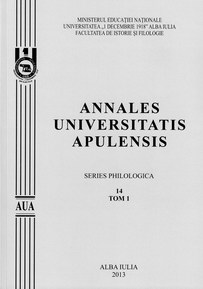Remarks on the Anglo-American lexical word stock glossed in DCR2 and DCR3
Remarks on the Anglo-American lexical word stock glossed in DCR2 and DCR3
Author(s): Constantin ManeaSubject(s): Language and Literature Studies
Published by: Universitatea »1 Decembrie 1918« Alba Iulia
Keywords: Anglicisms; monolingual dictionaries; glossary; norm/ standard; etymology; lexicography
Summary/Abstract: The paper is intended as a case study on the fate of those neologisms – especially Anglicisms – that have recently entered the Romanian language, as they are illustrated by one of the most representative dictionaries (in actual fact, an extremely ample “list of words”) that have been produced by linguistic research on Romanian lexis in the last few decades. The introduction is an overview of the arduous lexicographical effort undertaken by the author, lexicographer Florica Dimitrescu (the dictionary, DCR – Dictionary of Recent Words, is now in its third edition, co-authored with two other prominent Romanian linguists). The actual body of the present paper is composed of punctual remarks, regarding such aspects as: how some Anglicisms were glossed (in point of meaning / meanings), the new meanings that some words have acquired lately in Romanian (especially in the language of the press), the etymological indications that were provided, the manner of indicating form (i.e. the spelling and the orthoepic aspect of the respective terms), the most visible debatable cases or instances of disagreement on the status acquired by certain neologisms (i.e. the words fully accepted by Romanian language, and adapted to its specificity, the words which are felt as Anglicisms / Englished lexical items, the terms that are perceived as foreignisms / English, or American English words), etc. The author also attempted a statistical approach aimed at providing more concrete substance for the analytical observations undertaken as far as the dictionary’s inventory of neologisms is concerned. At any rate, the comparison of the number of words itself glossed by the two latest editions of the dictionary (the very last edition comprises nearly 10,000 entries) is intended to demonstrate the importance of the phenomenon of neologistic enrichment of a language’s vocabulary (including purely quantitative and numerical considerations). Some of the most clearly definable conclusions of the analysis undergone are the following: Even lexical ephemerides are worth being devoted attention and effort by specialists (those unrequited diligent workers toiling in the field of literary language), because glossing new words and trying to think of appropriate standardization for them is by no means vain effort; Vocabulary is a living organism, through its users, a body marked by unpredictability and subjectivity, etc.
Journal: Annales Universitatis Apulensis. Series Philologica
- Issue Year: 14/2013
- Issue No: 2
- Page Range: 421-434
- Page Count: 14
- Language: English

